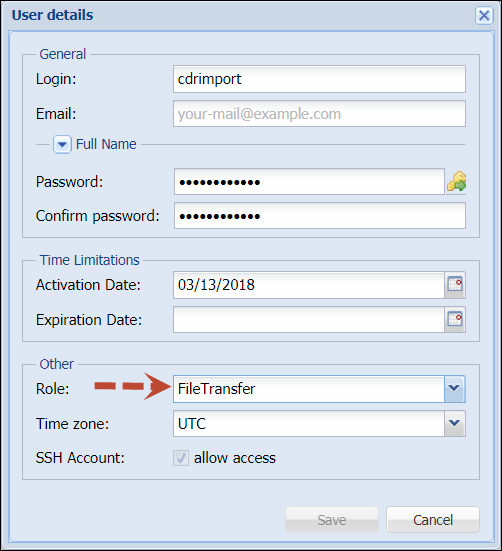Transmission of CDR files from external systems
PortaSwitch has a built-in FTP/SFTP server, where an external system (e.g., telephony gateway, producing CDR files) can submit CDR source files for processing.
The source file transmission can be done in one of the following ways:
- Your system downloads CDR files from your vendor’s server, where they accumulate CDR files from their network equipment.
xDR mediator operates as an FTP/SFTP client. It connects to the external system and downloads CDR source files via FTP/SFTP. To make this happen, the administrator defines the credentials necessary for accessing the external system as well as the path to the folder from which to download the files.
- Your vendor’s network equipment such as BroadWorks generates and uploads CDR files to your FTP/SFTP server.
In this case, the file transmission flow is reversed. The administrator enables FTP/SFTP server on the PortaSwitch side (disabled by default) and creates username/password that allows access to it. The external system uses these credentials to upload the CDR source files to the specified folder on the server.
FTP/SFTP file transfer (inbound or outbound) is the recommended configuration compared to other ones (e.g., via secure copy - SCP) since it increases the system security (the user does not have access to anything outside the FTP server) and simplifies xDR mediator support through system updates.
Retroactive billing during xDR import
To calculate charges for a billing session, PortaBilling must consider the delay between the session’s effective time – the time when the session starts/is connected, and the charging time – the time actually charged. For real-time charging this delay is very short (only a couple of seconds). When it comes to xDR import, the delay can be considerable – several hours or even days (e.g., roaming xDRs can arrive several days after actual service usage). In the latter case, the billing periods that these charges and volume discount consumption refer to can already be closed.
Therefore, to ensure correct charging for a closed billing period, PortaBilling retroactively bills during an xDR import and uses the tariff applicable at the time the session started to produce the xDRs. The xDRs are then added to the open billing period.
Volume discount usage is withdrawn from the closed billing period’s counters.
Consider the following example:
Let’s say John Doe has a “100 free roaming minutes” monthly quota with one rollover. Throughout November he makes calls for 90 minutes in roaming and on December 1 his billing period closes. Thus, 10 minutes remain from the November quota.
On December 2nd the roaming vendor sends you CDRs with John’s service usage for November 30, which includes 5 minutes of calls. Upon xDR import, these charges are applied to John’s November billing period and his quota counters for November are adjusted by 5 minutes. When John makes calls on December 3, his December quota now includes 105 minutes (5 minutes rolled over from November).



